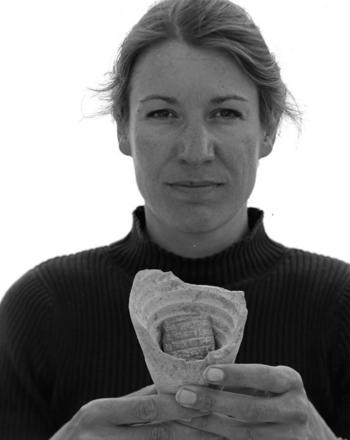Stephanie Rost (Januar-September 2021)

City University of New York Queensborough Community College, History
Gastwissenschaftlerin
Stephanie Rost is an Assistant Professor in the History Department of Queensborough Community College of the City University of New York. She has earned her BA at the Free University of Berlin, her MA at Vienna University, and her PhD from the State University of New York at Stony Brook (2015). Prior to joining Queensborough Community College faculty, Stephanie Rost was the 2015-2017 postdoctoral fellow at the Oriental Institute of the University of Chicago and the 2017-2019 visiting assistant professor at the Institute for the Study of the Ancient World at New York University.
Stephanie Rost was trained primarily as an archaeologist and anthropologist but has a strong background in ancient languages. She adopts the approach of historical archaeology by drawing on historical and archaeological data in the reconstruction of ancient history. Her research interests focus on the investigation of the organization of early state economies with an emphasis on agricultural systems and political ecology. Her doctoral research was concerned with the technical and social aspects of water management of the late 3rd millennium B.C. southern Mesopotamia as a means to assess the degree of political centralization in early state societies.
Introduction to Ancient Civilizations (Queensborough Community College)
Watermanagement in the Ancient World (New York University)
The Archaeology of Mesopotamia and Egypt (New York University)
Ancient Economies: The Agricultural Foundation (New York University)
Historical Archaeology of Mesopotamia (University of Chicago)
Ihr aktueller Forschungsschwerpunkt liegt auf der Rekonstruktion der historischen Geographie des späten 3. Jahrtausends v. Chr. im südlichen Mesopotamien, um die Interpretation des umfangreichen Datensatzes ökonomischer Dokumente aus dieser Zeit zu erleichtern. Diese Dokumente haben zwar das Potenzial, einen aussergewöhnlich detaillierten Einblick in die Organisation der frühen staatlichen Wirtschaft zu geben, wurden aber aufgrund eines unzureichenden Verständnisses des geographischen Kontextes, in dem diese wirtschaftlichen Transaktionen stattfanden, nicht ausreichend genutzt. Uns fehlen die archäologischen Daten, die es uns erlauben würden, die Standorte der Produktionszentren, das Netz der Transportwege und die Bewegung von Gütern und Dienstleistungen zu kartieren. Stephanie Rost leitet seit 2018 ein archäologisches Feldprojekt («The Umma Survey»), um diesem Mangel abzugehen.
Selected publications
2019 Altaweel, M., Marsh. A., Jotheri, J., Hritz, C., Fleitmann, D., Rost, S.,Lintner, S., Gibson, McG., Bosomworth, M., Jacobson, M., Garzanti, E., Limonta, M., and Radeffm G. “ New Insights on the Role of Environmental Dynamics Shaping Southern Mesopotamia: From the Pre-Ubaid to the Early Islamic Period”, Iraq 81: 1-24.
2019 “Navigating the Ancient Tigris – Insights into Water Management in an Early State. Journal of Anthropological Archaeology 54: 31-47.
2018 Jotheri, J., Altaweel, M., Tuij, A., Anma, R., Pennington, B., Rost, S., and Watanabe, C. E. “Holocene Fluvial and Anthropogenic Processes in the Region of Uruk in Southern Mesopotamia.” Quaternary International 483: 57-69.
2017 “Water Management in Mesopotamia from the Sixth till the First Millennium B.C.” WIREs Water, 2017, e1230, (DOI)10.1002/wat2.1230.
2014 Rost, S., D. K. Wright, and M. K. Woodson. “Application of Remote Sensing Technologies in Detecting Prehistoric Canals of the Hohokam Period (A.D. 450–1450) in the Middle Gila River Valley, Arizona.” Archaeological and Anthropological Sciences 7/2: 295-315. (DOI) 10.1007/s12520-015-0244-5.
2011 Rost, S., and A. Hamdani. 2011. “Traditional Dam Construction in Modern Iraq. A Possible Analogy for Ancient Irrigation Practices in Mesopotamia.” Iraq 73: 201¬-220.
2011 “Irrigation Management in the Ur III period: A Reconsideration Based on a Case Study of the Maintenance of the íd-NINA-šè-DU Canal of the Province Lagaš.” In The Empirical Dimension of Ancient Near Eastern Studies, edited by Gebhard Selz with the collaboration of Klaus Wagensonner, pp 211¬–270. Wiener Offene Orientalistik 6. Wien: Lit-Verlag.

